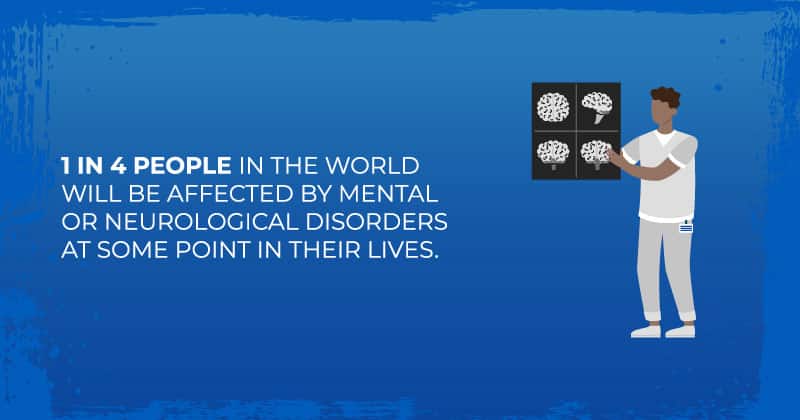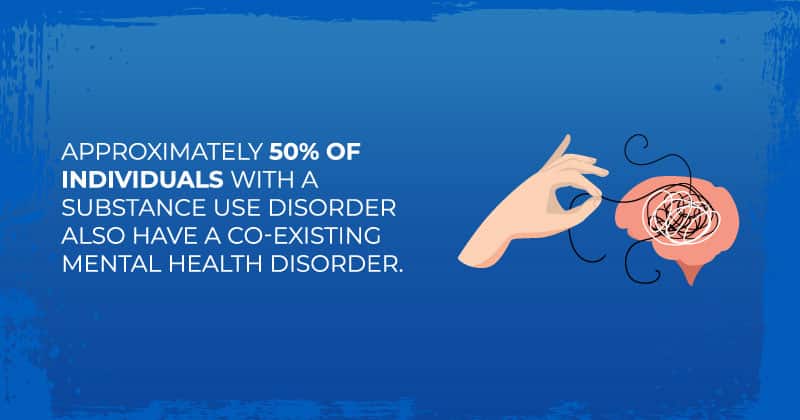

Dual Diagnosis
Break through the complexity of dual diagnosis at J. Flowers Health Institute.
Join us in the journey to address mental health and addiction.
Table of Contents
Reach Out to Learn More
What is Dual Diagnosis?
Dual diagnosis, also known as co-occurring disorders, refers to the presence of both a mental health condition and a substance use disorder in the same person. This means that an individual with a dual diagnosis has two different but interconnected health conditions.
Comorbidity Explained
Who Is Prone to Co-Occurring Disorders?
Young adults are also at higher risk. Dual diagnosis often starts in young adulthood – a time when many mental health disorders first appear. Adolescence is also when individuals are more likely to experiment with substances, increasing their risk of developing a substance use disorder.
Individuals who start drinking at age 14 or younger have a 47% chance of developing alcohol dependence later in life, whereas those who start drinking after age 21 have only a 9% chance.1
Prevalence of Dual Diagnosis
Common Types of Dual Diagnosis
Depression
This is a mood disorder that involves persistent feelings of sadness and losing interest in activities that you once enjoyed. Many people with depression may turn toward substances to cope with symptoms. About 1 in 3 individuals with mood disorders, like depression, also suffer from a SUD.5
Alcoholism and Depression
Anxiety
Attention Deficit Hyperactivity Disorder (ADHD)
Post-Traumatic Stress Disorder (PTSD)
PTSD is a mental health condition caused by experiencing or witnessing a traumatic event. Individuals with PTSD may turn to alcohol or sedatives to cope with their symptoms.
Bipolar Disorder
Bipolar disorder is a mood disorder characterized by extreme shifts in emotions and behavior, alternating between periods of depression and euphoria. Alcohol is commonly misused for the temporary relief it can provide from bipolar episodes.
Schizophrenia
Other Combinations and the Challenges of Identification
Our “Living MRI” evaluation provides a holistic overview of your health. This sophisticated assessment can help us establish a comprehensive diagnosis and treatment plan for individuals with co-occurring disorders.

Can One Disorder Exacerbate the Other?
If someone is dealing with depression, they might start using drugs to help lift their mood. However, many substances can increase feelings of sadness or emptiness, so the person’s depression might become even more severe, especially if they are using substances in the long term.
Important Note About Co-Occurring Disorders
Risk Factors for Dual Diagnosis
Genetic Vulnerabilities
Dual diagnosis is significantly influenced by your genes. This means that if someone in your family has a history of mental health or substance use disorders, you may also have a higher risk of experiencing a dual diagnosis.
Environmental Risks
Psychological and Developmental Factors

The Importance of Integrated Treatment in Dual Diagnosis
Enhanced Recovery and Improved Outcomes
Breaking the Cycle of Relapse
However, relapse doesn’t mean that treatment has failed. Integrated treatment can help break this cycle by treating both disorders together. This reduces the chance that symptoms of one disorder will exacerbate or cause symptoms of the other.
Addressing Underlying Causes and Risks
Integrated treatment for co-occurring disorders involves digging deeper to address the underlying causes and risks of both mental health challenges and substance use disorder.
For instance, if you use drugs or alcohol to cope with symptoms of depression or anxiety, integrated treatment can help you find more effective coping strategies.
Assessment and Diagnosis of Dual Diagnosis
The process begins with a ‘Living MRI’, a thorough review of your medical history, which helps create a unique evaluation schedule.
Challenges in Diagnosis and Differential Diagnosis
This means that what might seem like a symptom of a mental health disorder could be a consequence of substance misuse, and vice versa.
How Can J. Flowers Health Institute Help?
Holistic Evaluation of Co-Occurring Disorders
At J. Flowers Health Institute, we believe in a holistic evaluation of co-occurring disorders. This means that we look beyond just the symptoms of mental health and substance use disorders. We consider factors like your overall physical health, lifestyle habits, relationships, and environmental conditions.
Our holistic approach may include physical therapists, dieticians, psychotherapists, and more. Our professionals work in unison to evaluate how these different factors might be influencing your mental health and substance use.

Treatment Approaches for Dual Diagnosis
Pharmacotherapy
Commonly Prescribed Medications for Mental Health and SUD
In managing co-occurring disorders, the choice of medication largely depends on the specific mental health condition and substance use disorder at play. For mental health conditions, the medications used might include antidepressants, mood stabilizers, and antipsychotics, among others.
Challenges and Considerations in Medication Management
One challenge is the potential for drug interactions. Since medication will be used to manage both the mental health condition and the substance use disorder, it’s essential to ensure that the combined use of these drugs doesn’t result in harmful interactions.
These interactions could lead to increased side effects, decreased effectiveness of one or both medications, or other unexpected outcomes. Another significant consideration is the potential for a substance use disorder developing from the medication.
Psychotherapy: Individual and Group Therapy
Psychotherapy plays a significant role in managing co-occurring disorders. This approach aims to help individuals understand their feelings, thoughts, and behaviors.
Cognitive-Behavioral Therapy (CBT)
CBT is a widely used method for treating dual diagnosis. It focuses on identifying and changing unhelpful thinking patterns that may lead to negative behaviors.
What is Cognitive Behavioral Therapy?
Dialectical Behavior Therapy (DBT)
DBT helps you accept and tolerate distressful thoughts and emotions, instead of struggling with them. It can be particularly helpful in treating dual diagnosis. It promotes emotional regulation and decreases harmful behaviors related to substance use.
Motivational Interviewing (MI)
Other Effective Psychotherapeutic Approaches
Apart from these, there are many other therapy options effective in dual diagnosis treatment. These include family therapy, group therapy, and 12-step groups.

A Comprehensive Approach to Integrated Treatment at J. Flowers Health Institute
What Does Our Dual Diagnosis Treatment Include?
Our approach to treating dual diagnosis is thorough and personalized. We understand that every individual’s journey is unique. Our “Living MRI” reflects this belief.
Here’s what you can expect from our comprehensive dual diagnosis program:
- Comprehensive Diagnostic Evaluation: We will delve deep into your medical history, lifestyle, and present symptoms. We use this information to inform a detailed evaluation process that encompasses medical evaluations, psychiatric assessments, neuropsychological testing, substance use disorder testing, and more.
- Treatment Plan Development: Drawing from the insights gained during the evaluation, our multidisciplinary team will develop a treatment plan. This will address both the mental health and substance use disorders concurrently. This integrated approach is essential for ensuring a successful recovery from dual diagnosis.
- Customized Stabilization Program: To prepare you for the diagnostic process and the subsequent treatment plan, our Bespoke Stabilization Program provides 24/7 care from a dedicated medical team. This ensures that you are in the right physical and mental state to start your recovery journey.
- Ongoing Support: After your time with us, you can expect continued support. Our alumni receive regular check-ins and assistance, ensuring they have the help they need to maintain optimal health in the long term.
More Than a Diagnosis: A Path Toward Wellness
If you or a loved one are struggling with co-occurring disorders, reach out to us today. Let our team help you navigate this challenging journey with expert care, understanding, and support.
Resources
-
- https://www.niaaa.nih.gov/news-events/news-releases/early-drinking-linked-higher-lifetime-alcoholism-risk
- https://www.who.int/news/item/28-09-2001-the-world-health-report-2001-mental-disorders-affect-one-in-four-people
- https://www.ncbi.nlm.nih.gov/books/NBK571451/
- https://www.samhsa.gov/data/sites/default/files/reports/rpt29393/2019NSDUHFFRPDFWHTML/2019NSDUHFFR090120.htm
- https://www.ncbi.nlm.nih.gov/pmc/articles/PMC2851027/
- https://www.ncbi.nlm.nih.gov/pmc/articles/PMC5646360/
- https://nida.nih.gov/publications/drugs-brains-behavior-science-addiction/drug-misuse-addiction









